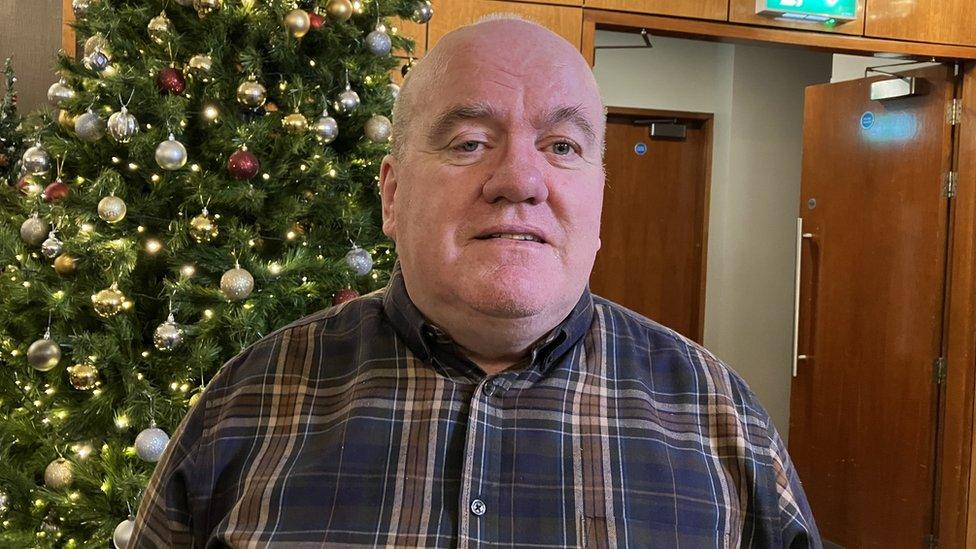'I'd never have imagined being a carer so young'

Maureen Crossan cares for her husband Patrick
- Published
Maureen Crossan has been caring for her husband Patrick since he was diagnosed with Parkinson's at the age of 50.
"Being a carer isn't something I would have seen myself being at such a young age,” she said.
"You're constantly looking out for any new symptoms as things progress so differently for different people and that can be stressful".
She was speaking after a report indicated those caring for people with Parkinson’s are struggling to look after them properly.
The Parkinson's: Who Cares?, external report found that carers were "fighting against the tide" and "mentally and physically tired".
The Department of Health said it recognised the "crucial role" that unpaid carers have and acknowledged the "importance of supporting carers to look after their mental health and wellbeing".
Maureen Crossan told BBC News NI that being a carer means "always being on alert".
She believes that "greater flexibility and education about Parkinson's" and an "understanding from the health minister" is needed in Northern Ireland.
She told the BBC that Patrick hasn't been able to meet his consultant this year and that while there are specialist nurses throughout Northern Ireland, they can be "difficult to get an appointment with".
'Difficult reading'
The 'Parkinson's: Who Cares?' report was launched to mark the start of Carers Week at Stormont.
Parkinson's UK has said the report makes for "difficult reading" and that the "depth of difficulties" faced everyday by carers is "stark".
What is Parkinson's?
Parkinson's is a degenerative condition which affects how your brain communicates with the muscles in the body.
The three main symptoms, external of Parkinson's are a tremor, slowness of movement and muscle stiffness.
A person with Parkinson's can also experience a wide range of psychological problems.
In the UK, about 153,000 people are already living with the illness.
In 2023, it was estimated that, external more than 4,000 of those were in Northern Ireland.
Improved healthcare 'would reduce stress'
Sarah McCully Russell, of Parkinson’s UK in Northern Ireland, said: "Time and time again, we heard that carers wanted people living with Parkinson’s to have access to an improved health care system.
"This would help the person they care for to live well with their condition, which would in turn reduce the stress and pressure faced by carers.
“Despite their daily tasks and frustrations, it was their loved ones who were firmly in their minds."
Parkinson's UK has asked for a plan to support the implementation of the review's recommendations, alongside the financial commitment required.
The charity has also called on the Northern Ireland Executive to ensure the Regional Review of Neurology is completed as soon as possible.
The Department of Health said that a "wide range of issues relating to carers" were highlighted in the Reform of Adult Social Care consultation and that "several actions were proposed to address these issues".
The department added that mental health services in Northern Ireland are provided "in line with the regional stepped care model" and are "available to everyone".
"All who need care and treatment, including carers, will be provided with services that are clinically appropriate".

Maureen told the BBC mornings are full when caring for someone with Parkinson's, making it hard to contact GPs
'What are they going to do about it?'
Going forward, Maureen said it would be helpful to make it easier to contact GPs.
"You have to ring before 10 o’clock in the morning just to get an appointment," she said.
"Often with somebody with Parkinson’s, you’re getting them up, you’re getting their medication, you’re looking after them and you’re having to sit with a phone and try and get through to a doctor."
She is also having difficulty getting prescriptions, and said that the lack of medication is "stressful" and "mentally exhausting".
“You’re now really having to go four times to the pharmacist because they can’t get the medication in, so you’re backwards and forwards.
"If medication stops for a person with Parkinson’s, it’s detrimental to their condition and then to the person who is looking after them."
“You know it’s not enough now to say there’s delays with medication. Why are there delays? What are they going to do about it?".
Related topics
- Published1 January 2024

- Published26 January 2023

- Published12 April 2024
